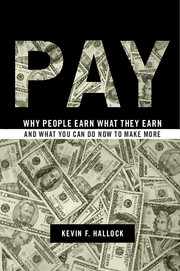Book contents
- Frontmatter
- Contents
- Figures
- Tables
- Acknowledgments
- PART I HOW HARD CAN THIS BE?
- 1 Common Sense, Economics, and HR
- 2 Wages, the Wage Distribution, and Wage Inequality
- 3 The Facts
- 4 The Difference Between Wages and Total Compensation
- PART II HOW ORGANIZATIONS SET PAY STRUCTURE AND WHY
- PART III HOW PEOPLE ARE PAID CAN MEAN AS MUCH AS HOW MUCH THEY ARE PAID
- PART IV WHAT YOU CAN DO TO MAKE MORE AND CONCLUDING COMMENTS
- Notes
- References
- Index
4 - The Difference Between Wages and Total Compensation
Is There a Difference Between Employee Value of Compensation and the Cost to Organizations?
from PART I - HOW HARD CAN THIS BE?
Published online by Cambridge University Press: 05 October 2012
- Frontmatter
- Contents
- Figures
- Tables
- Acknowledgments
- PART I HOW HARD CAN THIS BE?
- 1 Common Sense, Economics, and HR
- 2 Wages, the Wage Distribution, and Wage Inequality
- 3 The Facts
- 4 The Difference Between Wages and Total Compensation
- PART II HOW ORGANIZATIONS SET PAY STRUCTURE AND WHY
- PART III HOW PEOPLE ARE PAID CAN MEAN AS MUCH AS HOW MUCH THEY ARE PAID
- PART IV WHAT YOU CAN DO TO MAKE MORE AND CONCLUDING COMMENTS
- Notes
- References
- Index
Summary
Given my work with companies and with practitioners who set compensation for their employees, I don't think there is enough communication between employers and employees regarding costs of compensation versus value to employees. Employees often know what they are “paid” or, at least, what they “take home” or even their taxable income. But most people don't truly understand how much their total compensation costs their employer. This chapter first discusses the fact that employers pay for many things that employees don't directly see in their paychecks. What are employer costs of employee compensation? The chapter also suggests that employers that pay relatively more in non-direct-paid compensation should communicate they do this so as to gain an advantage over their competitors. Third, the chapter suggests that employees should spend time trying to figure out what their employers pay in terms of total compensation, relative to competitor firms. Finally, the chapter discusses that employers could better elicit the value employees place on certain forms of compensation and explicitly suggests specific examples where the cost of compensation to the firm varies from the value employees place on compensation and what the implications of these issues may be. Later in the book (in Chapter 11) we will cover more detail on why firms provide certain forms of pay (e.g. bonus) over other forms (e.g. salaries) and why firms offer certain benefits.
Employer Costs of Employee Compensation (It's a Lot More Than Wages)
How much does it cost employers to have certain workers on hand? This sounds a little bit like what we were exploring in Chapter 2, but it is distinctly different. Previously we were studying the hourly wages of workers in the United States. In this section, the focus is on the cost to employers for each hour worked. The cost per hour for each hour worked is considerably higher. The data for this analysis come from a Federal Government Survey called “Employer Costs of Employee Compensation.” This survey covers roughly 62,700 occupations from a sample of 13,200 establishments in private industry and roughly 11,700 occupations from a sample of about 1,900 establishments in state and local governments. These data are much different than the data used in Chapter 2 and part of Chapter 3. Those data were asked of individuals about their earnings. These data come from questions that are asked of employers about some of the occupations within their organizations. The surveys are incredibly detailed and complicated and can take up to three hours to complete.
- Type
- Chapter
- Information
- PayWhy People Earn What They Earn and What You Can Do Now to Make More, pp. 40 - 48Publisher: Cambridge University PressPrint publication year: 2012



